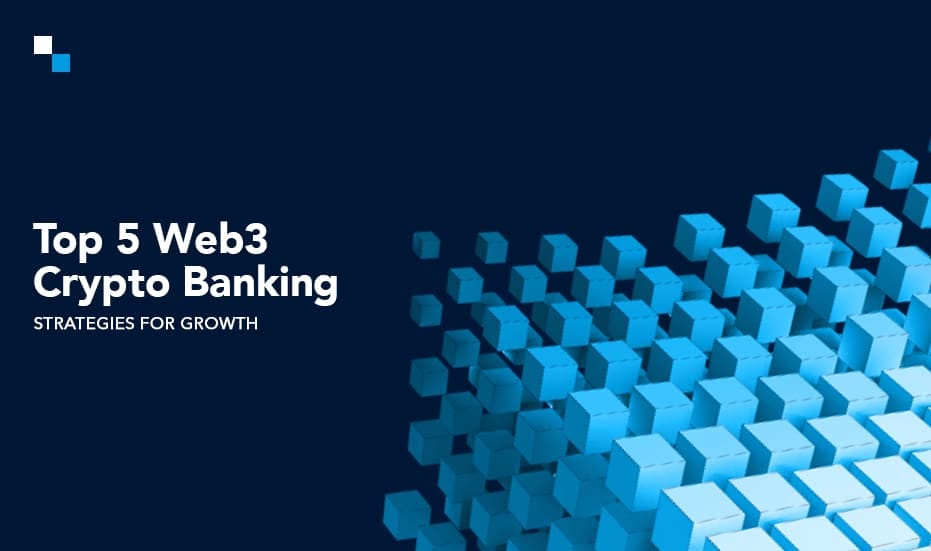
Master the Crypto Market: Explore The Power of Automated Trading Bots
May 28, 2024
Highlighting Top Reasons to Build SIM Card Integrated Crypto Wallets
May 28, 2024The Fintech industry has boomed in recent years, offering innovative solutions for managing money, making payments, and accessing financial services. However, traditional Fintech solutions still face limitations. A lot of users have trouble with expensive transaction costs, opaque procedures, and restricted access to specific financial goods and services.
Web3 is a revolutionary movement that uses blockchain technology to decentralize finance. With more accessibility, security, and transparency available, this new environment has the potential to completely change the financial system. This blog post dives into the top 5 strategies that Web3 crypto banking solutions offer to address these existing Fintech challenges. We’ll explore how Web3 can revolutionize the way we manage our finances and unlock a new era of financial empowerment.
Let’s start!
Must-Know Features of Web3 Crypto Banking Solutions
No wonder, Web3 digital banking solutions have the potential to completely change how we manage our finances. By utilising blockchain technology, these cutting-edge platforms provide a range of features that solve traditional banking’s shortcomings and open up fascinating new avenues.
Some of the salient characteristics of Web3 crypto banking solutions are :-
1. Decentralization
Unlike traditional banks, Web3 banking solutions operate on a decentralized network (blockchain). This means no single entity controls your finances, eliminating centralized risks and fostering greater transparency. You have complete control over your assets and access to your financial data.
2. Security
Blockchain technology offers unparalleled security for your funds. Transactions are cryptographically secured, making them highly resistant to fraud and hacking. Additionally, distributed ledger technology ensures a permanent and tamper-proof record of all transactions.
3. Faster and Cheaper Transactions
Crypto banking solutions utilize blockchain technology to facilitate faster and cheaper transactions. Traditional financial institutions often have lengthy clearing times and high fees, especially for international transfers. Web3 eliminates these intermediaries, leading to near-instantaneous and more cost-effective transactions.
4. Increased Financial Inclusion
These solutions have the potential to revolutionize financial inclusion. By removing geographical or bureaucratic barriers, anyone with an internet connection can access financial services. This empowers the unbanked and underbanked populations to participate in the global financial system.
5. Programmable Money
Smart contracts, a core element of Web3, enable programmable money. These self-executing contracts automate financial processes and enable innovative financial products. Imagine automated investments, scheduled payments, or customized lending agreements triggered by specific conditions – all without the need for intermediaries.
6. Enhanced User Experience
Web3 crypto banking solutions are designed with user experience in mind. Many offer user-friendly interfaces and mobile applications, making it easier than ever to manage your finances on the go. Additionally, the transparent nature of blockchain technology allows users to track their financial activity in real-time.
7. Wider Range of Financial Products
The decentralized nature of Web3 fosters innovation in financial products. Users can gain access to a wider range of financial products and services, potentially including decentralized lending platforms, tokenized assets, and novel investment opportunities.
8. Community Ownership
Certain crypto banking solutions operate as Decentralized Autonomous Organizations (DAOs). This means that users hold governance tokens, allowing them to participate in decision-making processes and shape the future of the platform.

Challenges of Fintech Web3 Digital Banking Solutions Can Fix
While Fintech has brought convenience and innovation to finance, several key challenges still plague the industry.
- Challenge 1: High Transaction Fees
Traditional financial institutions often levy significant fees for transactions like money transfers, international payments, and even ATM withdrawals. These fees can eat into user savings and make frequent transactions a costly endeavor. This disproportionately affects those who rely on digital payments the most, hindering financial mobility.
- Challenge 2: Lack of Financial Inclusion
Millions of people globally remain unbanked or underbanked, lacking access to basic financial services like savings accounts, loans, or credit cards. Traditional banking systems often impose high minimum balances or require extensive documentation, making it difficult for low-income individuals or those without a steady income to participate in the financial system. This exclusion creates a significant barrier to financial security and economic participation.
- Challenge 3: Security Vulnerabilities
Centralized financial systems are prime targets for cyberattacks. Data breaches and unauthorized access can lead to significant financial losses and identity theft for users. Additionally, reliance on intermediaries can create single points of failure, making the entire system susceptible to disruptions.
- Challenge 4: Limited Financial Product Innovation
Traditional financial institutions can be slow to adopt new technologies or offer innovative financial products. This can limit user choice and hinder access to cutting-edge financial tools or services. Additionally, the approval process for new financial products can be lengthy and bureaucratic, stifling innovation within the industry.
- Challenge 5: Slow Transaction Processing Times
International payments or transfers between traditional institutions can take several days to settle, creating delays and inconvenience for users. This is particularly problematic for businesses or individuals who rely on fast and efficient movement of funds. Slow processing times can also hinder real-time financial management and limit the flexibility of financial transactions.
Top 5 Strategies for Web3 Crypto Banking Solutions to Address Fintech Pain Points
Building on the foundation laid by traditional Fintech, Web3 crypto banking solutions leverage innovative strategies to empower users and create a more secure, transparent, and efficient financial ecosystem.
The top 5 strategies that set these solutions apart :
1. Decentralization & User Control
By using decentralised networks (blockchains), Web3 banking eliminates the need for centralised management of your money. This means :
- Greater Security : No single entity can manipulate your funds or access your financial data.
- Enhanced Transparency : All transactions are recorded on a public ledger, fostering trust and accountability.
- User Empowerment : You have complete control over your assets and access to manage them directly.
2. Faster & Cheaper Transactions
Web3 eliminates the need for intermediaries like banks or clearing houses. Transactions are facilitated directly between users on the blockchain, resulting in :
- Near-Instantaneous Settlements : No more waiting days for transfers to clear, allowing for faster financial mobility.
- Reduced Transaction Fees : By removing intermediaries, Web3 significantly lowers transaction costs, particularly for international transfers.
3. Programmable Money & Financial Automation
Smart contracts are self-executing agreements written on the blockchain. This unlocks the potential for :
- Automated Financial Processes : Schedule payments, manage investments, or trigger loan repayments automatically based on predefined conditions.
- Customized Financial Products : Develop innovative financial products tailored to specific needs, like automated savings plans or peer-to-peer lending platforms.
4. Democratization of Finance & Broader Access
Web3 removes geographical and bureaucratic barriers associated with traditional banking systems. This opens doors to :
- Financial Inclusion : Anyone with an internet connection can access essential financial services, empowering the unbanked and underbanked populations.
- Greater Innovation : The decentralized nature of Web3 fosters a breeding ground for novel financial products and services tailored to a wider range of users.
5. Community Governance & Collaborative Growth
Certain Web3 crypto banking solutions function as DAOs (Decentralized Autonomous Organizations). This means :
- User Participation : Token holders have a say in the platform’s development through voting on proposals, shaping the future of the service.
- Community-Driven Growth : Collaborative decision-making fosters a sense of ownership and incentivizes users to contribute to the platform’s success.
How Antier Can Help?
The financial landscape is undergoing a significant transformation, driven by the innovative potential of Web3 crypto banking solutions. These solutions offer a compelling alternative to traditional banking, empowering users with greater control, security, and access to a wider range of financial products and services. From near-instantaneous transactions and lower fees to personalized solutions and enhanced security, Web3 promises a future where finance is more accessible, efficient, and user-centric.
Antier is a leading provider of crypto banking solutions. We offer a comprehensive suite of services, from building secure and user-friendly Web3 digital banking platforms to developing innovative financial products tailored to your specific needs. Whether you’re a financial institution seeking to enter the Web3 space or an individual looking to explore the possibilities of decentralized finance, we are here to help you navigate the frontier.
Discuss your unique business idea with us and let’s get started!



